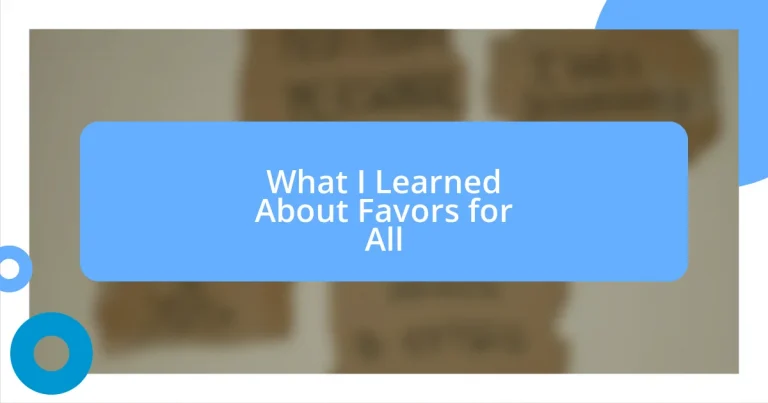Key takeaways:
- Favors reflect trust and connection, enhancing relationships and fostering a sense of community through both practical help and emotional support.
- Returning favors emphasizes reciprocity and appreciation, reinforcing bonds and creating cherished memories that enrich relationships.
- Building a favor exchange network thrives on clear communication, ongoing engagement, and offers opportunities for collaboration and deeper connections within communities.
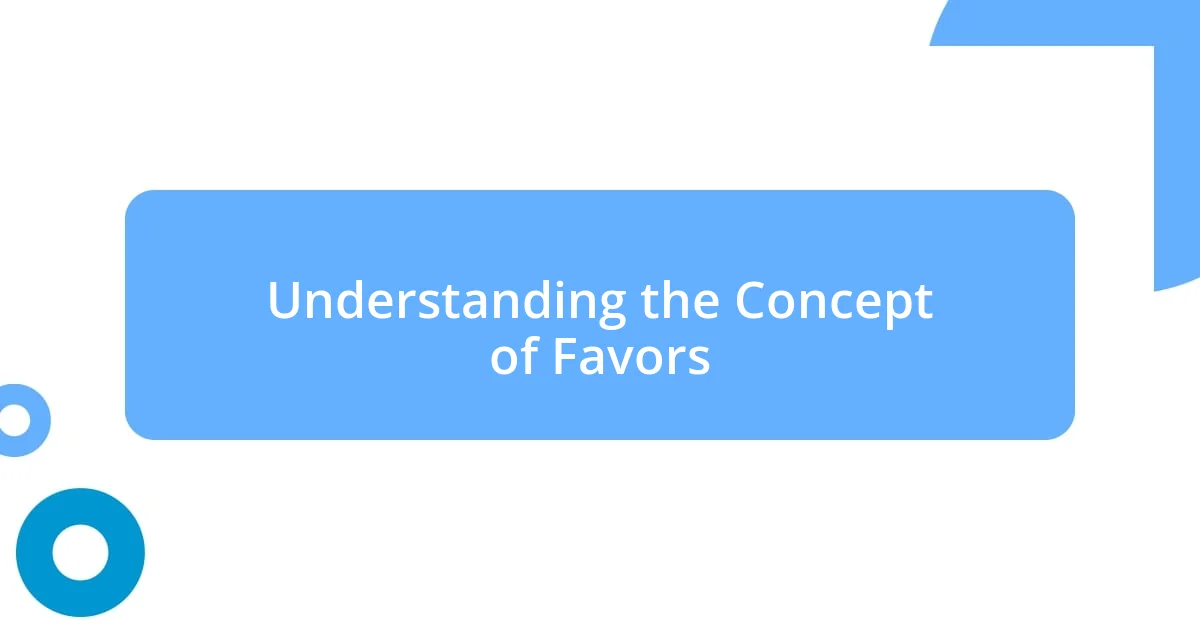
Understanding the Concept of Favors
When I think about favors, I often reflect on the balance of give and take in relationships. Have you ever noticed how a small act of kindness can ripple through your social circle? For instance, I remember when a friend borrowed my favorite book and returned it with a handwritten note. That simple gesture made me feel appreciated and deepened our bond.
Favors aren’t just about the act itself; they’re a reflection of trust and connection. I once did a favor for a neighbor by watching their dog while they were on vacation. In return, they offered to help me with my garden—a fantastic exchange that ended up creating not just a shared task, but a lasting friendship. Doesn’t it make you consider how these exchanges shape the fabric of our community?
At the core of favors is the emotional currency they hold. There are times when I’ve felt overwhelmed with tasks and a friend stepped in to lend a hand, lifting the weight off my shoulders. In that moment, I realized that favors are not merely transactional—they forge deeper connections and enhance our sense of belonging. Don’t we all crave that sense of support in our lives?
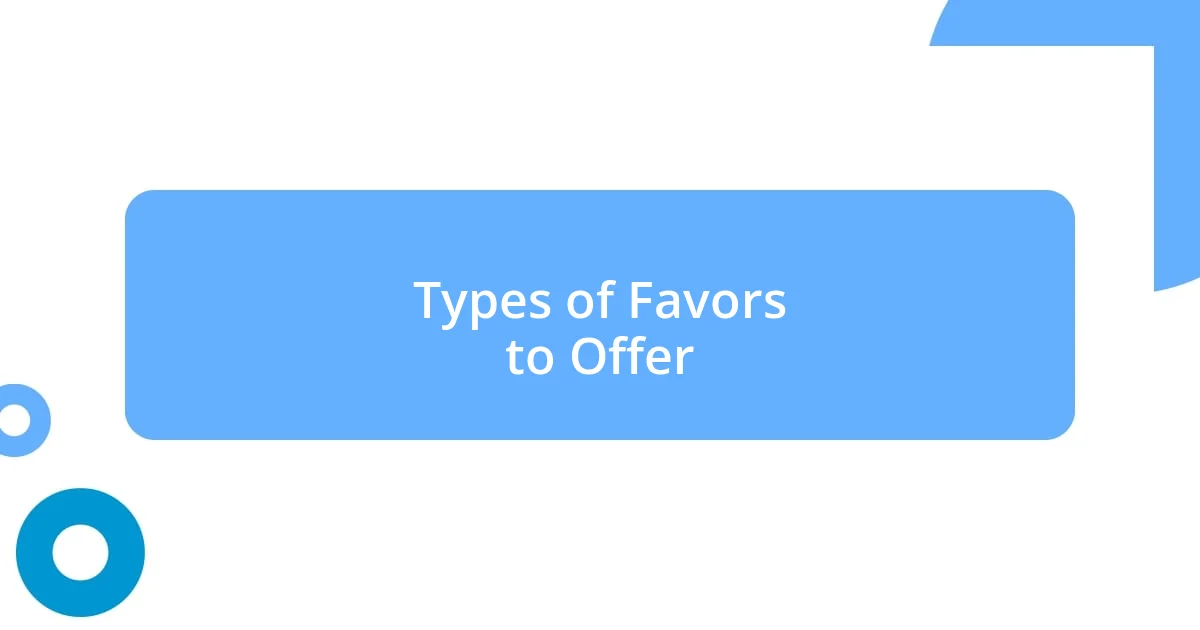
Types of Favors to Offer
When it comes to the types of favors you can offer, options are abundant and often tied to the unique dynamics of your relationships. I recall a time when I had a friend who was struggling with their resume. I took the time to help them polish it up and practice for interviews. Not only did it feel good to empower them, but that one favor helped solidify our trust in each other. It’s fascinating how something as simple as offering your skills can strengthen connections.
Here’s a rundown of different types of favors you might consider:
- Practical favors: Help with errands, like grocery shopping or picking up dry cleaning.
- Emotional support: Lending a listening ear during tough times or providing encouragement.
- Skill-sharing: Offering your expertise in areas like cooking, gardening, or tech support.
- Time commitments: Watching someone’s pet or housesitting for a friend when they’re away.
- Networking assistance: Introducing someone to a contact who could help them professionally.
These kinds of favors not only ease burdens but can also create a sense of community that enriches everyone involved. I’ve learned that sharing my time or expertise often leads to deeper discussions and connections that I cherish.
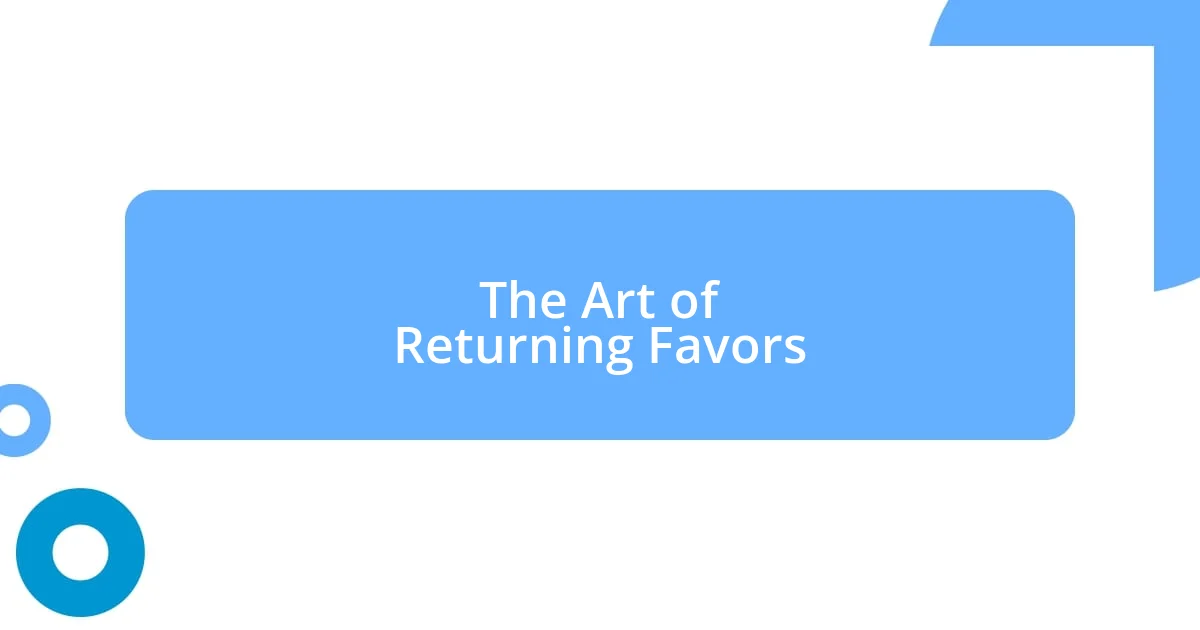
The Art of Returning Favors
When it comes to returning favors, I believe it’s about reciprocity and genuine appreciation. I remember a time when a coworker stepped in to help me finish a project that was weighing heavily on my shoulders. I was so grateful that I organized a surprise coffee break as a small way to return the kindness. That act not only brightened their day but also strengthened our team bond, showing that even simple gestures can lead to meaningful connections.
What strikes me is how returning favors often reflects our values and relationships. Think about it: when I helped a friend move into their new apartment, they treated me to a homemade dinner as a thank-you. That shared meal became a cherished memory, reminding us that favors create opportunities for both giving and receiving joy. Every time we return a favor, we reinforce our connections, making our relationships richer and more fulfilling.
Moreover, I find that the art of returning favors is about recognizing needs and being willing to act. For instance, when a neighbor fixed my leaky faucet, I made sure to return the gesture by offering them fresh vegetables from my garden. It made me realize that these exchanges don’t have to be grand; often, the simplest acts of kindness can have the most profound impact on our relationships. Isn’t it uplifting to think how a single favor can evolve into a pattern of goodwill that inspires others to do the same?
| Type of Favor | Example |
|---|---|
| Practical Help | Helping a friend move |
| Emotional Support | Listening to someone’s problems |
| Skill Sharing | Offering to tutor someone |
| Time Commitment | Watching pets while away |
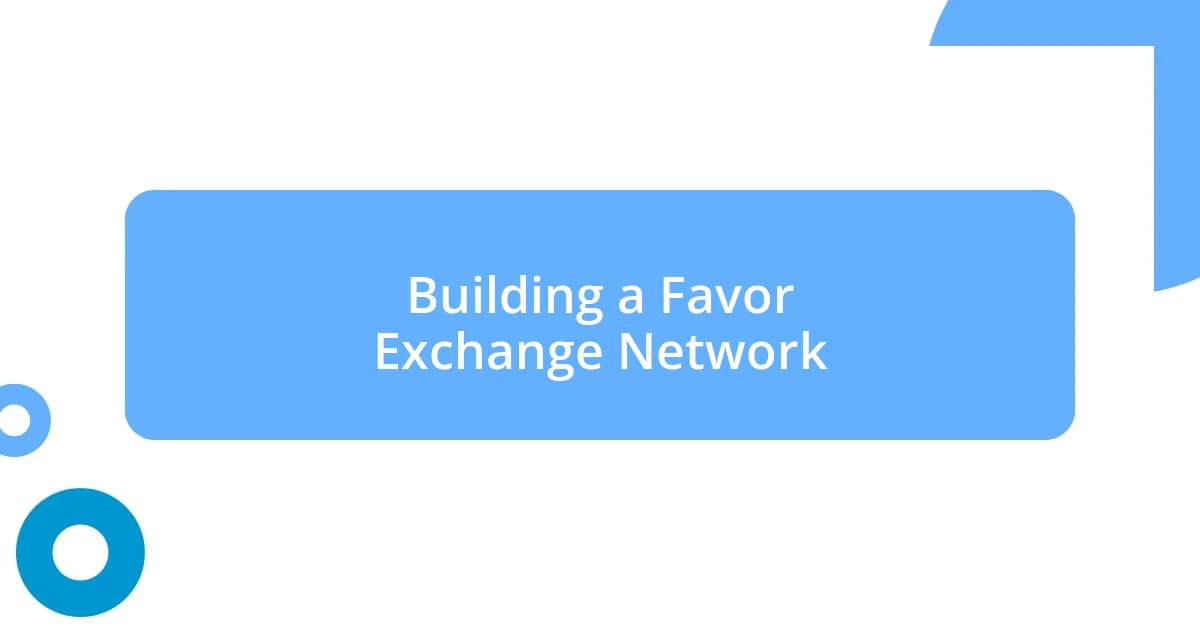
Building a Favor Exchange Network
Building a favor exchange network starts with identifying the people in your life who might benefit from your unique skills and experiences. I remember when I began reaching out to neighbors for simple tasks like gardening and tech help. It surprised me how quickly relationships blossomed; soon, we were not just exchanging favors, but sharing stories and laughter over coffee. Isn’t it incredible how a small gesture can spark deeper connections?
Next, I found that clear communication is key in establishing this network. When I offered to help a friend with their website, I made sure to express what I could realistically provide. By being upfront about my availability and skills, I set the stage for a supportive environment where we both felt comfortable asking for and offering help. Have you ever noticed how clarity transforms interactions into genuine exchanges rather than burdens?
Moreover, I learned that nurturing this network requires ongoing engagement. I once organized a small get-together among friends and acquaintances to discuss how we could support each other in our endeavors. That evening not only solidified our network but led to new opportunities for collaboration. I realized that fostering a favor exchange network is like tending to a garden; it thrives with attention, care, and a little creativity. How about you—what steps can you take to cultivate your own favor exchange community?
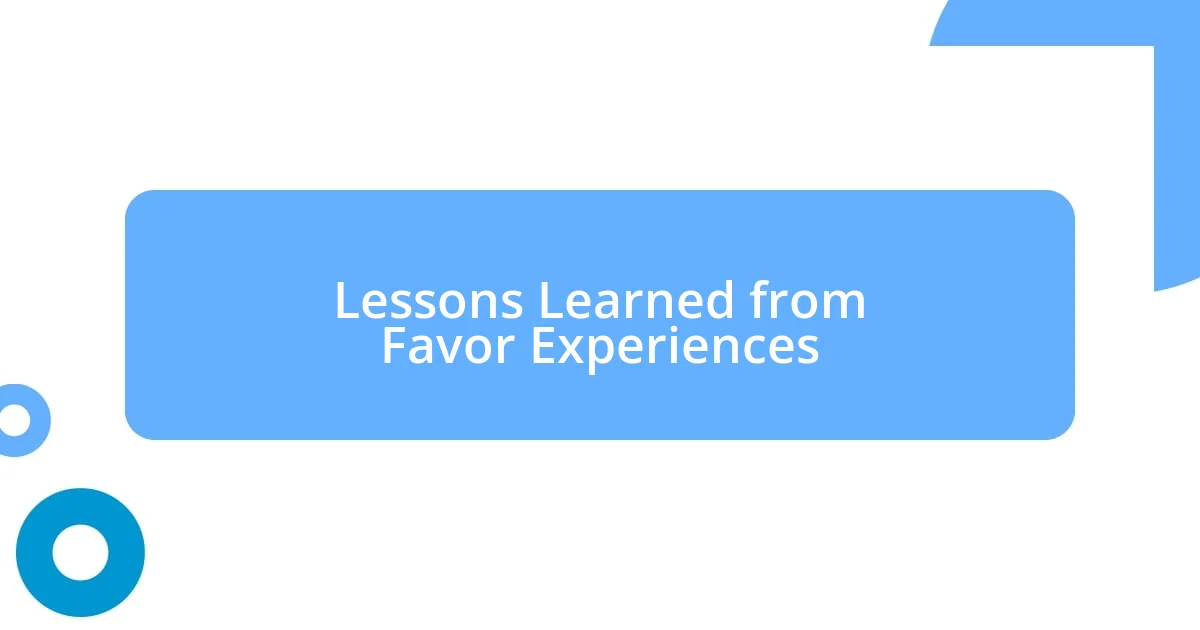
Lessons Learned from Favor Experiences
Reflecting on my experiences with favors, I’ve come to appreciate the unexpected ways they can unfold. I recall a moment when I helped an acquaintance organize her book collection. To my surprise, she later introduced me to a local author who became a mentor in my writing journey. This experience taught me that favors can lead to opportunities we never anticipate. Isn’t it fascinating how kindness can create a ripple effect?
I’ve also learned that not every favor needs to be reciprocated in the same form. For instance, my friend once spent an afternoon helping me brainstorm ideas for a project, and later I noticed her struggling with a difficult decision. My decision to simply listen and offer my support seemed small to me, but it meant the world to her. This exchange highlighted that favors are not confined to tangible tasks; emotional support can often be the most valuable gift of all.
Engaging in favor exchanges has transformed my perspective on community. There was a time when I started volunteering at a local shelter, initially thinking I was there to give back. Yet, I discovered that the friendships I formed with fellow volunteers brought joy and a sense of belonging to my life. It made me realize that every favor exchanged is an opportunity to strengthen our community ties. How often do we overlook the profound connections that can develop when we simply lend a hand?












